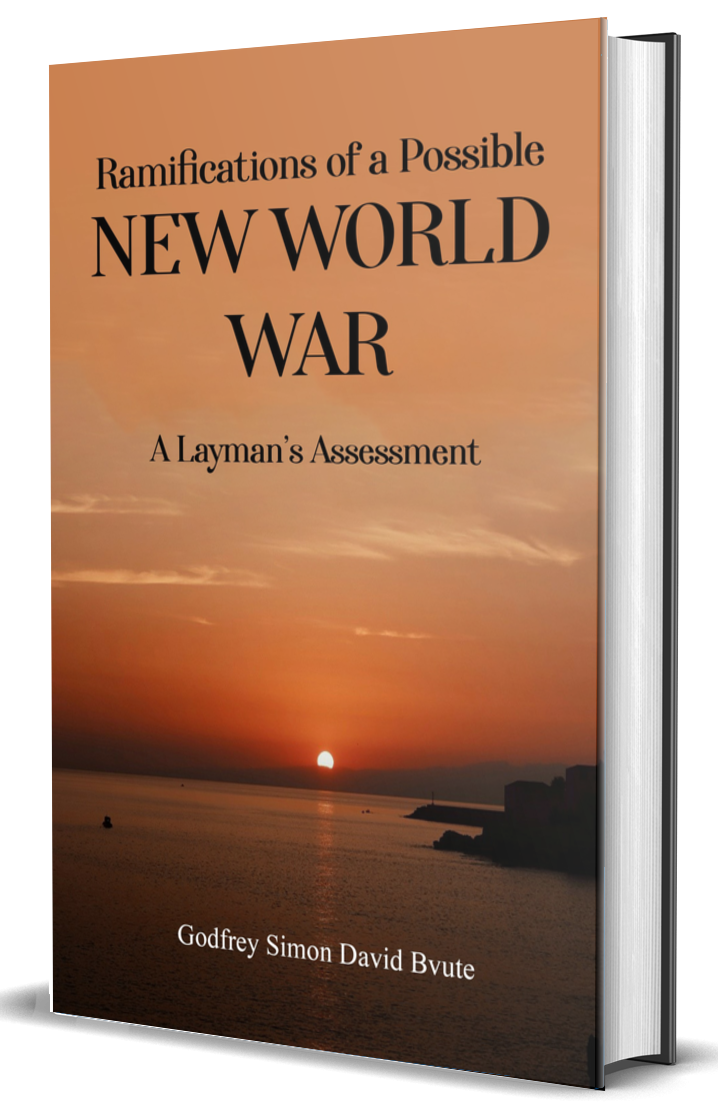History has often shown that global conflicts do not erupt overnight. Instead, they build gradually, fueled by political miscalculations, economic pressures, and sometimes military escalations.

In light of this, “Ramifications of a Possible New World War: A Layman’s Assessment” by Godfrey Simon David Bvute offers a meticulously researched, thought-provoking analysis of how the world finds itself at a dangerous crossroads—urging us to pay attention to the warning signs that are all too familiar from history.
Bvute begins by providing a stark overview of today’s geopolitical landscape. He particularly focuses on the ongoing war in Ukraine and the intensifying rivalry between NATO and Russia. He warns that while many see this conflict as a regional issue, its implications stretch far beyond Eastern Europe and can dissect how economic sanctions, arms supplies, and military alliances have escalated tensions to a level where confrontation between nuclear powers is a real and present danger.
It draws comparisons between the past and today’s geopolitical tensions, highlighting how ideological battles, economic struggles, and military buildups have once again placed the world on the brink of destruction. By examining the Cold War, World War II, and previous international conflicts, this book demonstrates how patterns of escalation have historically led to full-scale wars and how the same can happen to us.
Bvute does not merely speculate on the dangers of nuclear warfare. He provides concrete data on military capabilities. This includes the increasing stockpiles of advanced weapons. He explains in chilling detail how modern nuclear warheads far surpass those used in Hiroshima and Nagasaki, making even a “limited” nuclear conflict a world-ending catastrophe. The author argues that the world has moved away from Cold War-era security frameworks, such as arms control agreements, leaving a dangerously unstable global environment where nuclear escalation is more likely than ever.
The book also sheds light on the economic side of warfare. For example, Bvute explores the role of sanctions, trade restrictions, and economic policies as tools of modern conflict. He critiques Western-led sanctions on Russia. Rather than crippling its economy, he argues, it has led to new alliances and shifts in global trade. The rise of BRICS nations—Brazil, Russia, India, China, and South Africa—signals a shifting economic order that could challenge Western dominance. The author suggests that economic wars, while seemingly less destructive than traditional military conflicts, have long-term consequences that can be just as destabilizing.
Despite tackling complex topics, Ramifications of a Possible New World War writes in a way that both experts and lay readers can understand. The book avoids academic jargon, instead breaking down geopolitical events straightforwardly and engagingly. The book is rich with real-world examples, historical comparisons, and data-driven arguments that make a compelling case for why global tensions should concern everyone.
Africa’s position in this global crisis is another area of focus. Bvute argues that Africa must take a more active role in shaping international relations rather than being a passive player in the global power struggle. He also warns that external conflicts could have devastating economic and political consequences for the continent. Therefore, he emphasizes the need for African nations to adopt independent, pragmatic foreign policies rather than aligning blindly with global superpowers.
Ultimately, Ramifications of a Possible New World War is a call to action. Bvute urges us to stay informed, question political narratives, and push for policies that promote peace rather than escalation. His message is clear: the world is at a critical juncture, and the choices made today will determine whether we move towards peace or destruction.
Whether you are a student of international relations, a policymaker, or simply a concerned citizen, Bvute’s insights, with well-researched analysis, compelling arguments, and urgent warning, will deepen your understanding of the precarious state of world affairs.
The book is available on Amazon for purchase: https://www.amazon.co.uk/dp/1779341008